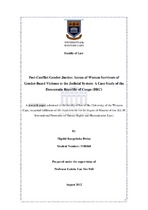| dc.description.abstract | During armed conflicts, women experience more abuses than their male counterpart. Besides, the disruption of national security systems resulting form the social and political troubles, exposes women to more violation of their human rights in the postconflict setting. During the last decade, the international community has employed noteworthy efforts to protect women from the effects of armed conflicts, and to ensure the prosecution of violators of women’s rights in post-conflict situations. This included inter alia, the adoption of binding treaties calling for protection of women against sexual and gender based violence(GBV), and the creation of an international Criminal Court and International tribunals to prosecute persons for the most serious crimes of international concern, including sexual and gender violence. During the armed conflict that occurred in the Democratic Republic of Congo (DRC) between 1996 and 2003, a significant number of GBV acts were committed against women. Reports and statistical data from humanitarian organisations working in the DRC indicated an increase of GBV acts against women after the official cessation of the conflict. Moreover, reports indicated the emergence of GBV acts against women in areas that did not witness such acts during the conflict. The research paper interrogates, from a criminal justice angle, the response given to GBV acts perpetrated against women in the post-conflict setting. Furthermore, the research questions the access of women to justice and interrogates the challenges bedevilling this access at the national and international level. In addition, the research formulates recommendations aimed at enhancing the access of women survivor of GBV to justice, and for an effective prosecution of perpetrators of such acts. | en_US |

